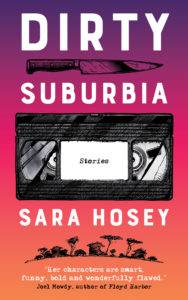 Review by Laura Dennis
Review by Laura Dennis
I love novels for the vast landscapes they traverse, the many shades of human experience they evoke. Although short fiction elicits pleasure on a different scale, every so often I encounter a story collection that offers both closely observed situations and a wide-ranging emotional exploration. Sara Hosey’s recently released Dirty Suburbia: Stories is one such book.
As I read, I often felt I had either known or been some version of Hosey’s female characters. I frequently wanted to cringe, even as I admired the author’s skill in depicting ordinary women’s lives. The protagonists are not always likable, but in a refreshing twist, are often unapologetically so. One also gets the impression that those who behave badly don’t always mean to, that they’re acting based on the limited options society offers rather than their heart’s truest desires.
The many-layered titles both of the collection and individual stories bear this out. Take “Dirty Suburbia,” for example, which literally refers to ugly suburbs characterized by abandoned strip malls and an air of neglect, while figuratively, it alludes to secrets, unsavory choices, and unfulfilling lives. Misogyny runs rampant, inflicted by men and internalized by women. At the same time, readers often encounter pairs of women bound to each other, sometimes sexually, sometimes as friends, often as a result of trauma.
As disturbing as many of the female characters may be, the male characters largely surpass them, with the possible exception of Sam, the Thoreau impersonator and love interest in “Land Mammals.” Otherwise, the best women can expect from men seems to be incompetence, as one woman explains whilst rejecting the possibility of her husband having an affair: “He’s too lazy. I suppose he could manage it if I handled the logistics. You know, wrote his dating profile, reminded him to sneak out, picked up the cheap roses…” Many of the stories set the bar at least that low, if not lower.
Perhaps because the male characters disappoint so often, women’s experiences, both positive and negative, are privileged throughout. Their stories, told mostly in the third person, with two first-person narratives, unfold in schools, video stores, seedy motels, highway rest stops, and lousy apartments, but also a few beautiful houses. Of particular interest to this reader are characters linked in some way to academia, a world depicted realistically with some humor but little joy. When a female English professor’s position at “an unremarkable four-year college” is eliminated, for instance, the narrative explains:
she got the email full of almost-apologies and an assurance that she could teach as an adjunct, which felt like the equivalent of someone running over your dog with their car and then offering, as a consolation, to let you clean out their hamster cage.
The academic world is one of several oft-used settings in Dirty Suburbia. Throughout, the stories are in conversation with each other, either thematically or through similar characters and other settings, for example a Wisconsin suburb or the borough of Queens. The shortest of the ten stories, “Elephant Realty,” takes this a step further by reprising characters from the longest, “Not for Everyone.” This phenomenon of recurring characters also occurs across “Blessed Virgin,” “Back to the Beach,” and the title story, “Dirty Suburbia.”
Taken as a whole, the stories range from a sort of playful charm, as in “Land Mammals,” to deeply unsettling, as in “Christine” or “Revenge of the Nerds.” (Reader beware—these titles are misleading!) Several stories have laugh-out-loud moments, particularly “Not for Everyone,” which starts out riotously, raunchily funny before ending on a somber note. Regardless of theme, plot, or tone, each story features a slow reveal of perfectly timed, well-chosen details that continually revise the reader’s understanding of the characters and their lives.
One final note: Gen X readers such as myself may find the collection particularly relatable thanks to cultural references spanning from our childhood—VCRs and Discmans, anyone?—to the present day. This in no way limits the collection’s audience or appeal. As in all the best fiction, the characters and situations retain a certain universality despite their strong roots in a given time and place. After all, the conditions that shape these women’s lives did not develop yesterday.
Although Hosey has written fiction before—versions of four of these stories have been published elsewhere and she has three YA novels to her name—this is her first full-length story collection. Readers can only hope the next volume is already underway.
Dirty Suburbia: Stories by Sara Hosey
Vine Leaves Press 2024 $17.99 [paper]$5.99 [e-book]
ISBN 978-3-98832-040-7 [paper]978-3-98832-041-4 [e-book]
Laura Dennis teaches world languages in Appalachia and co-edits book reviews for MER. She has published book reviews and her own creative work in a variety of outlets, including MER Vox Quarterly, Still: The Journal, Change Seven, Bethlehem Writer’s Roundtable, Red Branch Review, Bluff & Vine, Northern Appalachia Review, and Kentucky Philological Review.
